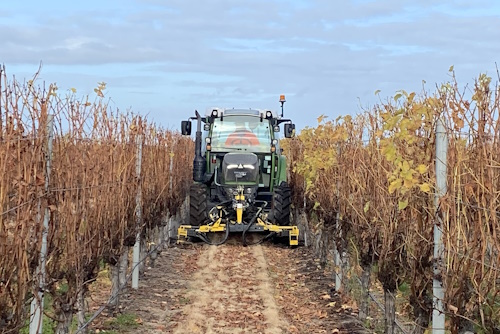
The waterjet weeder during a vineyard trial
A new project investigating precision weeding in vineyards could potentially prevent thousands of litres of herbicide use – and save thousands of litres of water – across New Zealand’s viticulture and horticulture industries.
Six New Zealand vineyards are partnering with Lincoln Agritech and the Ministry for Primary Industries’ (MPI’s) Sustainable Food and Fibre Futures (SFF Futures) fund to trial high-pressure water weeding (also known as waterjet weeding).
Mark Eder, Manager of Waiata Vineyards in Waipara, North Canterbury, heard about waterjet weeding several years ago, before seeing it in action in Italy in 2018.
He realised it could drastically reduce Waiata’s herbicide use. Not only does this fit with the vineyard’s ethos of sustainability, but it’s becoming increasingly important in a world demanding less pesticide use overall.
However, a trial of the technology in Hawke’s Bay showed that while the method successfully reduces vineyard weeds, the amount of water current technologies use is, for New Zealand, unsustainable.
So Waiata Vineyard joined forces with Cloudy Bay, Pernod Ricard, Indevin, Villa Maria, and Yealands vineyards, all in Marlborough, to import a second-hand Caffini Grasskiller from Australia. They are now working with Lincoln Agritech to rationalise the water use.
“Kiwis import a lot of equipment, but we always modify it to suit us and our environment,” Mark says. “We always try to improve stuff – it’s just what we do.”
The aim is to develop a smart sensing device and valve that integrate with the waterjet weeder so it activates only when it senses a weed – and turns off when it doesn’t.
“The original machine uses about 1000-1500 l/ha,” says Lincoln Agritech Agronomist Allister Holmes. “We intend, using vegetation sensing and an appropriate valve technology for the waterjet, to reduce this to less than 500 l/ha. That’s actually less than the typical amount of water used when spraying herbicide, which is between 600 and 900 l/ha.”
The project will run over two years, with the first trial set for vineyards in Canterbury and Marlborough this winter, ahead of the main weed growing season in spring.
Between them, the six vineyards cover nearly 5000 hectares. If the technology works as expected, it will take more than 50,000 litres of herbicide a year out of their weed management programmes.
But it could do even more. There are 24,000 hectares of grapes grown in Marlborough and Canterbury and around 68,000 ha of perennial tree crops, which could also benefit from the technology, grown nationally.
“If just another 10% of the perennial tree crops in New Zealand took up this technology, and replaced herbicides at the same rate, there would be more than 60,000 litres less agrichemicals used every year,” says Allister.
MPI’s director of investment programmes Steve Penno says the Government is committing $140,000 to the $238,000 project through SFF Futures, largely due to its emphasis on improving productivity sustainably.
“Reducing the use of chemicals and improving the efficiency of water use will have far-reaching positive impacts for the wine industry. These trials will ensure the technology is fit-for-purpose for New Zealand, and will provide another option for growers looking to reduce pesticide use and the associated costs.”


